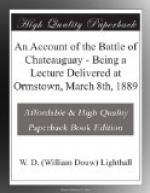“On that day or the day previous Captain Debartzch, of the Militia, was sent to the American headquarters with a flag. When he stated the number and description of troops by which General Hampton had been opposed, the latter, scarcely able to keep his temper, insisted that the British force amounted to 7,000 men. On being assured of the contrary, he asked: ‘What, then, made the woods ring so with bugles?’ Captain Debartzch explained this; but it was apparently to no purpose."[50]
The Americans retired on the 29th. “On the 30th a party of Indian Chasseurs, under Captain Ducharme, reported that the enemy had abandoned his camp at Piper’s Road in the greatest disorder, and was on the road to Four Corners.” The Canadians followed up and hung upon the rear and embarrassed the retreat. Canada was saved!
General Wilkinson was very severe on his fellow-general. “On the 4th of November,” he complains, “the British garrison of Montreal consisted solely of 400 marines and 200 soldiers. What a golden, glorious opportunity has been lost by the caprice of Major-General Hampton!"[51] Poor man, he was to have pretty much the same luck himself just afterwards! Wilkinson’s army proceeded on its own course down the river, but was almost as ignominiously defeated at Chrysler’s Farm on the 10th of November, where his 3,000 or 4,000 men were matched, partly in open field and partly with the assistance of a ruse as at Chateauguay, against 800 British and thirty Indians, under Colonel Morison, a man equally brave and able with McDonell and De Salaberry.
Mr. Dion, of Chambly, to whom the erection of a fine bronze statue of De Salaberry is due, has related to me a number of particulars from De Salaberry’s letters held by his relatives. The hero complains bitterly of Prevost and De Watteville—“those two Swiss”—and that on account of his religion he could get no higher than a Lieut.-Colonel. From the same letters it appears that the “Temoin Oculaire” was a young lawyer named O’Sullivan, later, Judge O’Sullivan, a man partly of Irish family, in person large and handsome, and a great friend of De Salaberry, who ever remained grateful to him for preserving record of his deed in his celebrated letter. It is commonly attributed to D.B. Viger. Another little fact mentioned in the correspondence of De Salaberry is that his men in the battle were barefooted.
The almost unique nature of the victory strikes one. Its keystone was De Salaberry’s masterly use of illusion. Of it was the choice of a thick wood to conceal his small force, their entrenchment behind the abatis and in bush positions, the unexpected fire from the left bank upon Purdy, the Indians in the woods, and, more than everything, the ruse of the multiplied bugles. But besides illusion there was the ablest possible disposition, for there seems no doubt but that no spot could have keen chosen along his projected route greater in strength when fortified and guarded just as that was. The enemy could only reach it fatigued, and far from sources of supply, the wood was thick, the ravines occurred happily, the river was free from fords for a long distance, and a frightful swamp occupied the opposite bank. How would De Watteville’s small and raw army have acted in the open country had this position not been tried?




